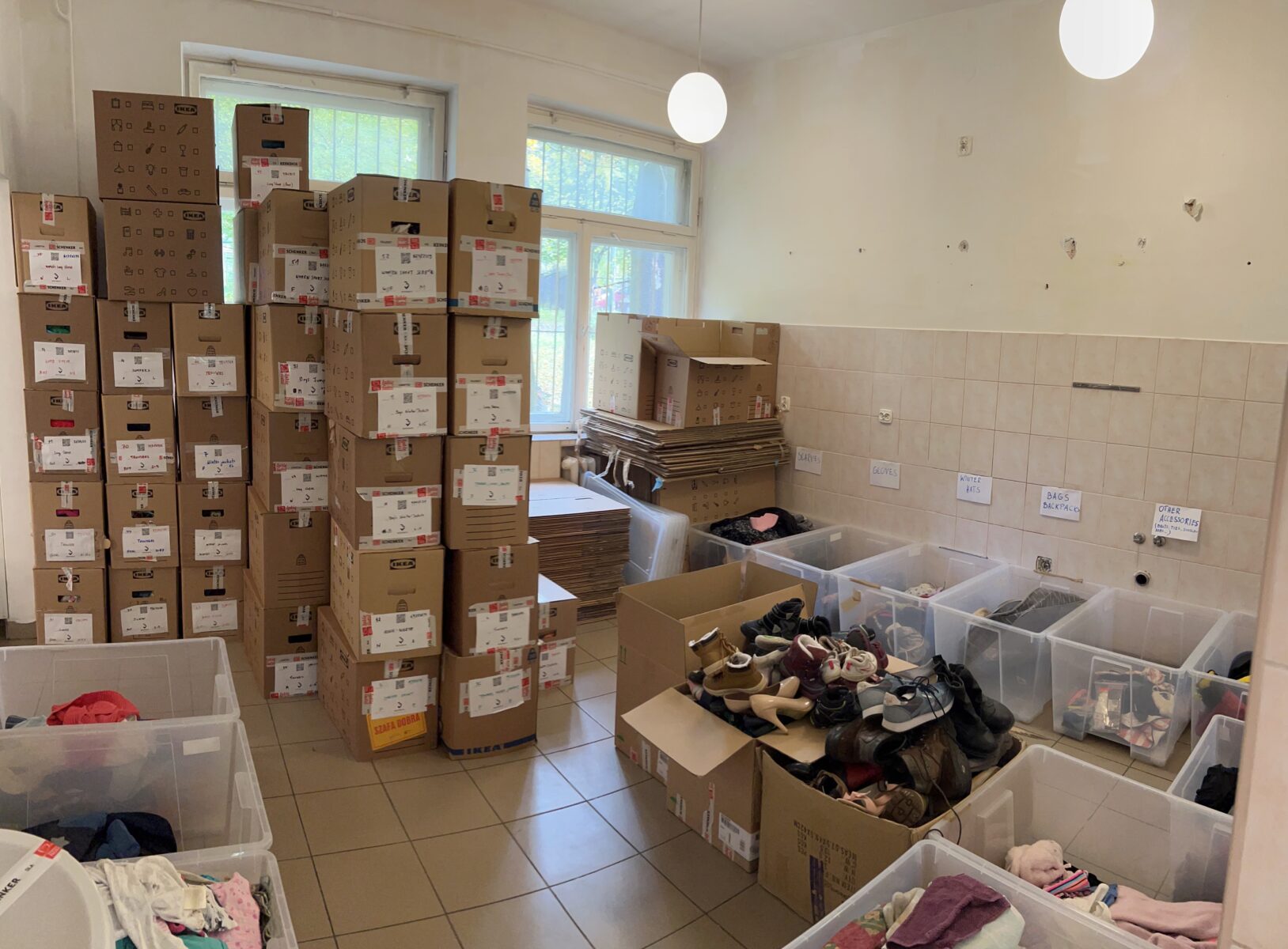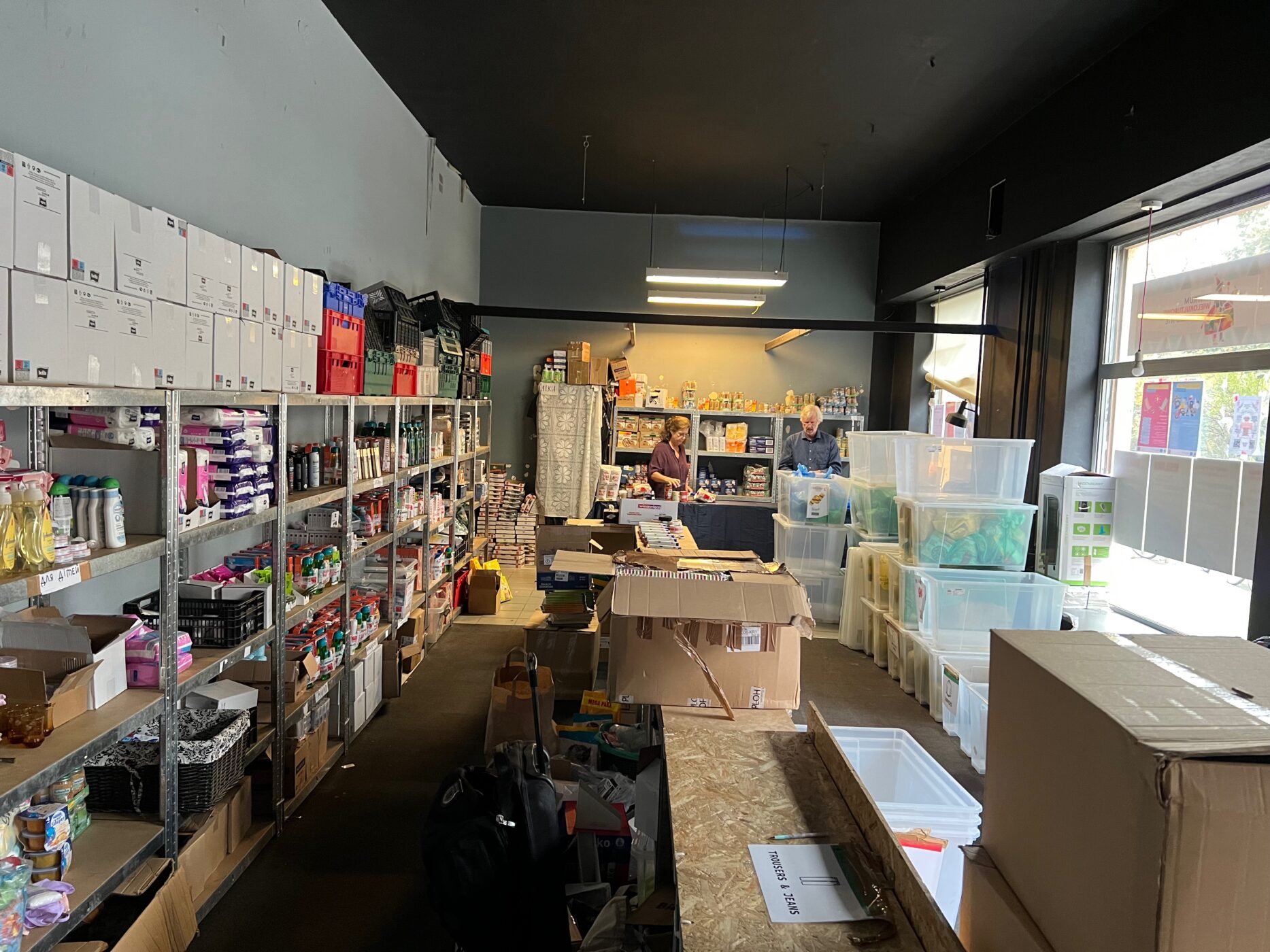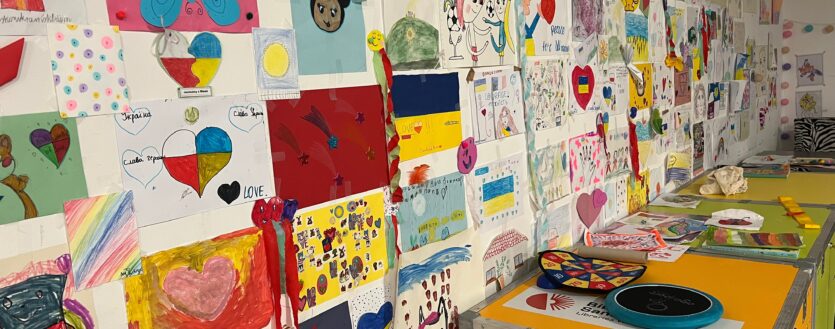
Second Verse, Same as the First
I recently wrote about volunteering for refugees fleeing from the war on the border of Ukraine and Poland. Even though I’ve volunteered a good amount in the U.S., it was my first look at war related humanitarian relief on the ground. In a nutshell, Ukrainians who seek shelter in other countries are exiting the country in specific places. For Ukrainians relocating to most Western European nations, they pass through the Polish border town of Przemyśl.

Spent 2 weeks volunteering in Poland for Ukraine refugees in Krakow and Przemysl.
To start the trip, I flew on United/Lufthansa from Charlotte –> Chicago –> Frankfurt –> Krakow. I took a bus from the Krakow airport to the main train station and took a train 2.5 hours to Przemysl, very close to the border of Ukraine. To get to Poland, I used around $1,200 worth of United Travel Bank funds that I had accumulated via credits from Amex Business Platinum cards that I had at various times over the past few years.
The first aid organization that I volunteered for, Fundacja Ocalenie is mostly funded through Save the Children and paid for my train ticket from Krakow to Przemysl (and back to Krakow). Fundacja Ocalenie and also provided lodging in the form of a small apartment in town, and a small daily food stipend for volunteers. I haven’t received any food stipend yet, but paying for train tickets in advance was a thoughtful gesture and made the transfer from the airport smoother. The advanced purchase train ticket didn’t have an assigned seat (on a full train), and I was lucky to find anywhere to sit.
Before leaving I met with a local magician to learn some magic tricks, and showed them to a young boy (who was maybe 4-5 years old) in my train car during the journey from Krakow. Google translate was helpful communicating with his mother and others in my train car, and the tricks made the 2.5 hour journey enjoyable. I’m no David Copperfield, but the young boy kept asking to do the magic tricks over and over, which was pretty funny. We became fast friends. I brought a bunch of school supplies with me for the kids I would be volunteering for, and gave him some boxes of crayons and markers before exiting the train. Just before exiting the train at the Przemsyl station, the boy ran up and gave me a hug which was a pretty special moment, and was something I’ll never forget.
I arrived in Przemysl in the evening and was met at the train station by another volunteer and walked to the small, 3rd floor apartment 15 minutes walk from the train station. In the transition from United to Lufthansa in Frankfurt, my checked bag was lost, but was delivered the next day around noon. The apartment for the volunteers was small, probably around 700-750 square feet with 4 people staying there. My bed was just a mattress on the floor in a room that was shared with another (male) volunteer. By coincidence, all 4 volunteers in Przemsyl that week were American (and vegan), which was an unusual coincidence. One of the female volunteers had been in the U.S. Navy, and said she originally wanted to go to Ukraine and fight with the Ukrainian army, but that she didn’t get a response from “the embassy” so she decided to volunteer instead.
The first week, I volunteered 6 days in a row, around 9 to 5 each day. My last night in Przemysl I got food poisoning (probably from a kebab place I frequented), and spent half the night in some pretty severe pain. Thankfully though the food poisoning wasn’t a 24 hour+ type of illness (and that it occurred at the end of my volunteer week), as elongated sickness can be absolutely debilitating.
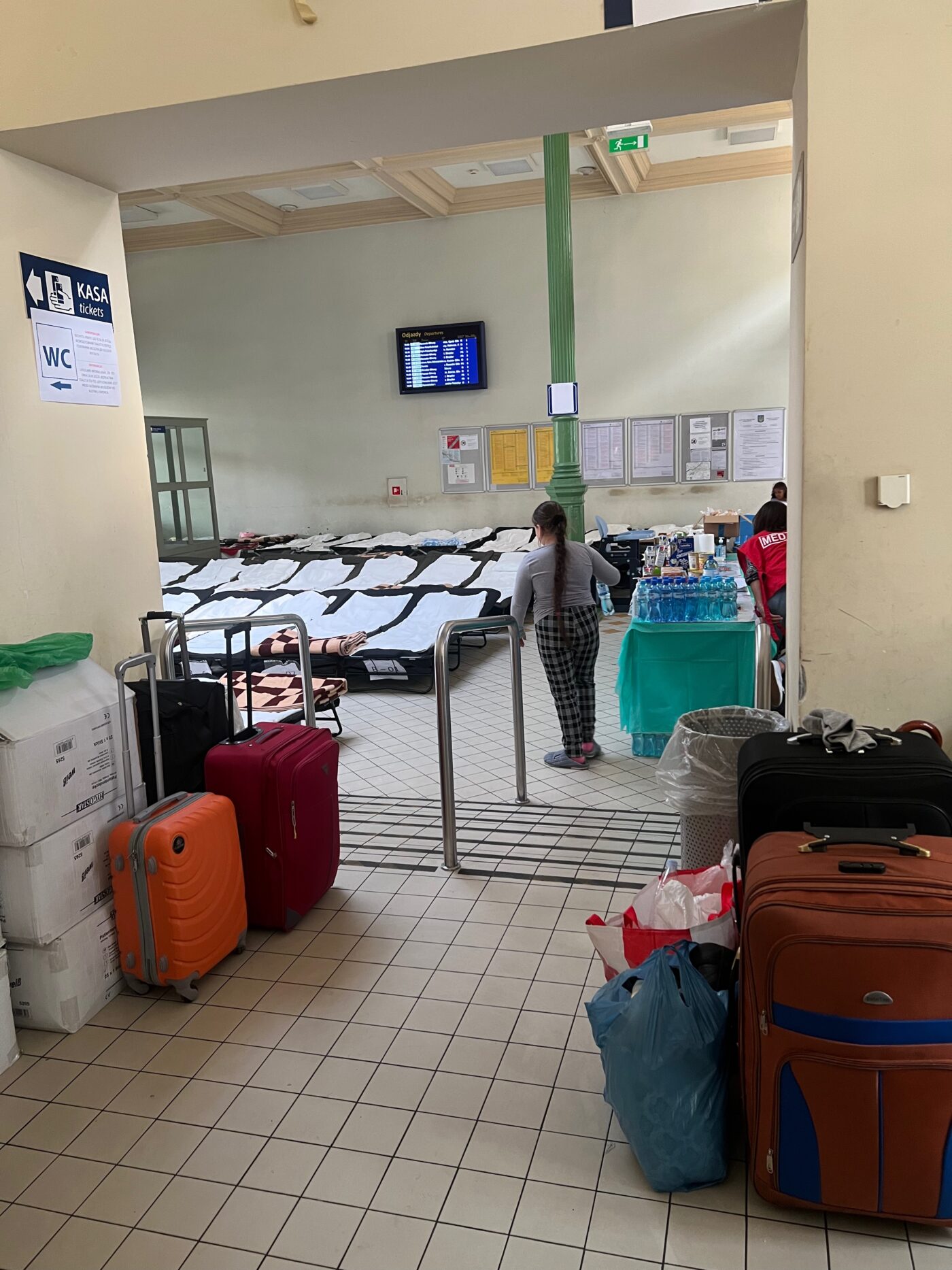
At the back of the train station in Przemyśl. There are some temporary beds set up for Ukrainian refugees fleeing the war. I accidentally walked into this area before departing to Krakow.
My first week of volunteering took place at an old single story mall on the outskirts of town. It was a 25 minute walk from the apartment each morning. The mornings were cool, but not cold with the smell of gas/coal in the air. Since the mall had essentially been vacant for some time, the Polish government decided to use it for the Ukraine refugee crisis. I was told that the mall could house around 1,000-1,500 people but that at the height of the war in March into the early summer, over 6,000 refugees per day were seeking aid at the center. During that time people were sleeping anywhere they could find space, with some finding space with local families. I can’t imagine that amount of people in that mall. There was space, but not for that many people.
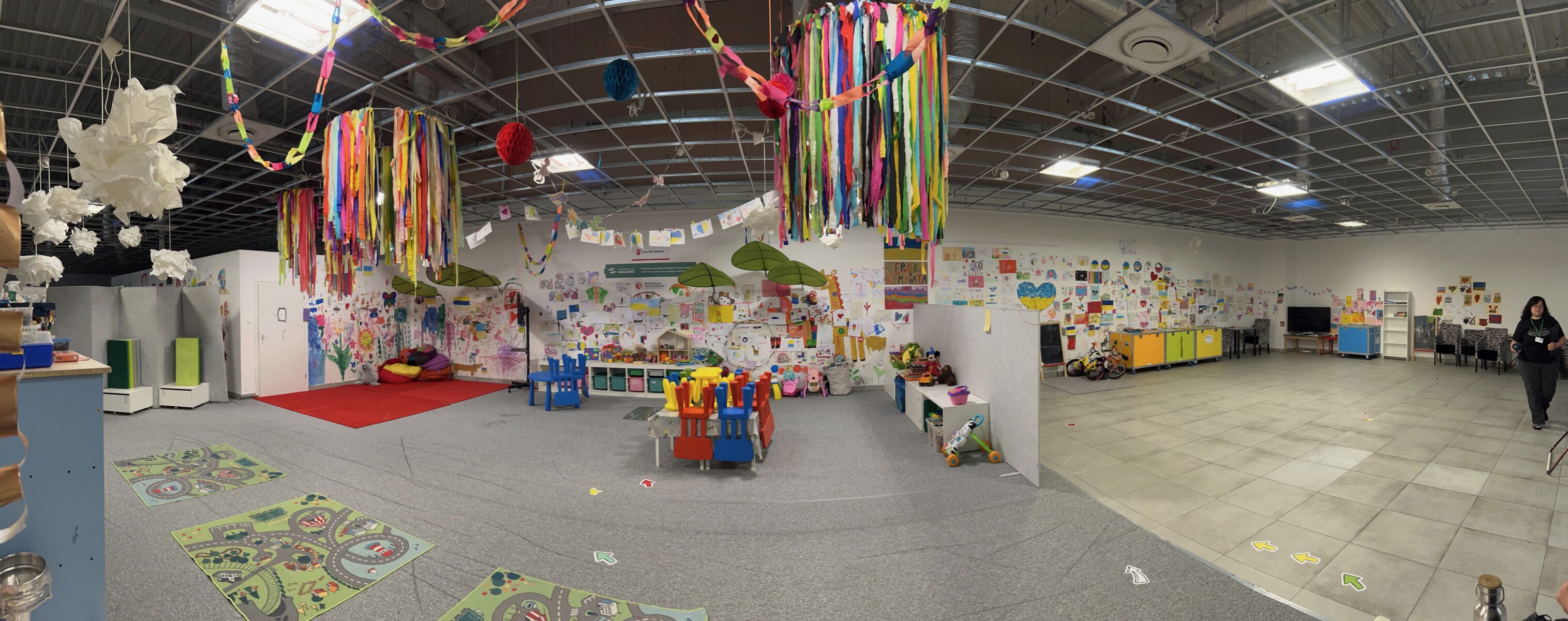
The volunteer space in the Przemsyl mall was divided into 2 sections, each around 30 yards x 25 yards, so not huge for dozens of young kids with lots of energy (and multiple bikes)! Half the space (left) was sort of the calm area where kids would play board games, play house, draw and be creative. The other side (right) was the active area, where we would play soccer, frisbee, and bike too. The photo (above) was taken a few minutes before we opened, but picture dozens of fired up kids running around the space – kids are kids in any country and love to play. Some kids show up and are shy at first, but it generally doesn’t take long for them to find something enjoyable to do in the space. Pretty cool to see happy children in any capacity, even if it was just for a few days before they boarded a train to the next destination.
I have been chatting with some of the volunteers since being back over the past few days. During my week of volunteering, we had around 20 or so kids in the center each day. With 2-4 volunteers per day it was a lot of work, but manageable. Last week though and likely due to the bombings that took place across Ukraine, the center had an influx of kids – or around 60 per day. To make matters worse, they had only 3 volunteers some days too. Most of the kids are good, but there are some not so nice ones too – and all need supervision. Having so many kids in a single space with few volunteers makes it a pretty hectic, and stressful day. I have sympathy and deep respect for the volunteers that were there last week. I can’t imagine more than 30 kids in that space. For reference and during the height of the refugee influx into Poland, they had over 100 kids at the center. Although the space at that time was slightly different, that number of children needing adult supervision is beyond my comprehension.
While I was volunteering, I made multiple trips to a great local toy store a quarter mile or so down the road and bought a bunch of toys and supplies for the kids. Before leaving for my trip, I went through a day of online training and at the end of it, asked the presenters if they needed any toys or other items for the kids. “No, I think we have everything that we need,” which turns out to not have been true, as many games were missing pieces, toys were broken, and there was a gap in toys that kids really like (girls=dolls and boys=trucks). Despite the confidence of the volunteer management, I did a GoFundMe before leaving and raised over $1,000 in about a couple of weeks, which I used for the kids in Przemysl and also for the families in Krakow.
I’ve been in touch with some of the volunteers still in Przemysl this past week, and unfortunately many of the toys that I bought for the kids, like dolls and self-propelling cars, were stolen last week. With 60 kids per day and just 3 volunteers, it’s not really a surprise. The dolls were especially popular, with nearly every young girl asking to take the dolls with them when they left each night. The theft news was disappointing, but wherever the toys landed, hopefully they are being enjoyed!
Week 2
For the second week in Poland, I volunteered for Dropen i Havet or A Drop in the Ocean (Drop) which is a nonprofit based in Norway. Both Fundacja Ocalenie and A Drop in the Ocean were featured in this New York Times piece that started my path to volunteer for Ukrainians fleeing the war. Drop has a local partnership with CW Wolontariat, another Polish nonprofit. The services that took place in Krakow through Drop and CW Wolontariat were comprehensive. Drop was brought in for its logistics expertise. Drop has experience with organizing donations in bulk – food, shoes, clothing, household items, etc. and CW Wolontariat worked with the Polish government to organize site locations and also supply part-time volunteers (mostly from Poland). Basically if someone was looking to create their own schedule or volunteer part-time, CW Wolontariat is the way to go. People volunteering with Drop are volunteering full-time for the period they signed up for with a week minimum and background check.
In a nutshell, I worked at 3 different donation sites in Krakow with each handling specific tasks and supplies. The first was the central location (below), working with and sorting donated clothes and shoes. The second was at a clothing site were the donated pieces were taken out of the packed boxes, and hung on racks so that (refugee) beneficiaries could browse and select items they wanted/needed. It was very similar setup to what you’d find at a retail clothing shop. The last place I volunteered at was a food and household items donation site where we took donated items, mostly from corporations, and packaged them into bags/taped bundles for people to come and take.
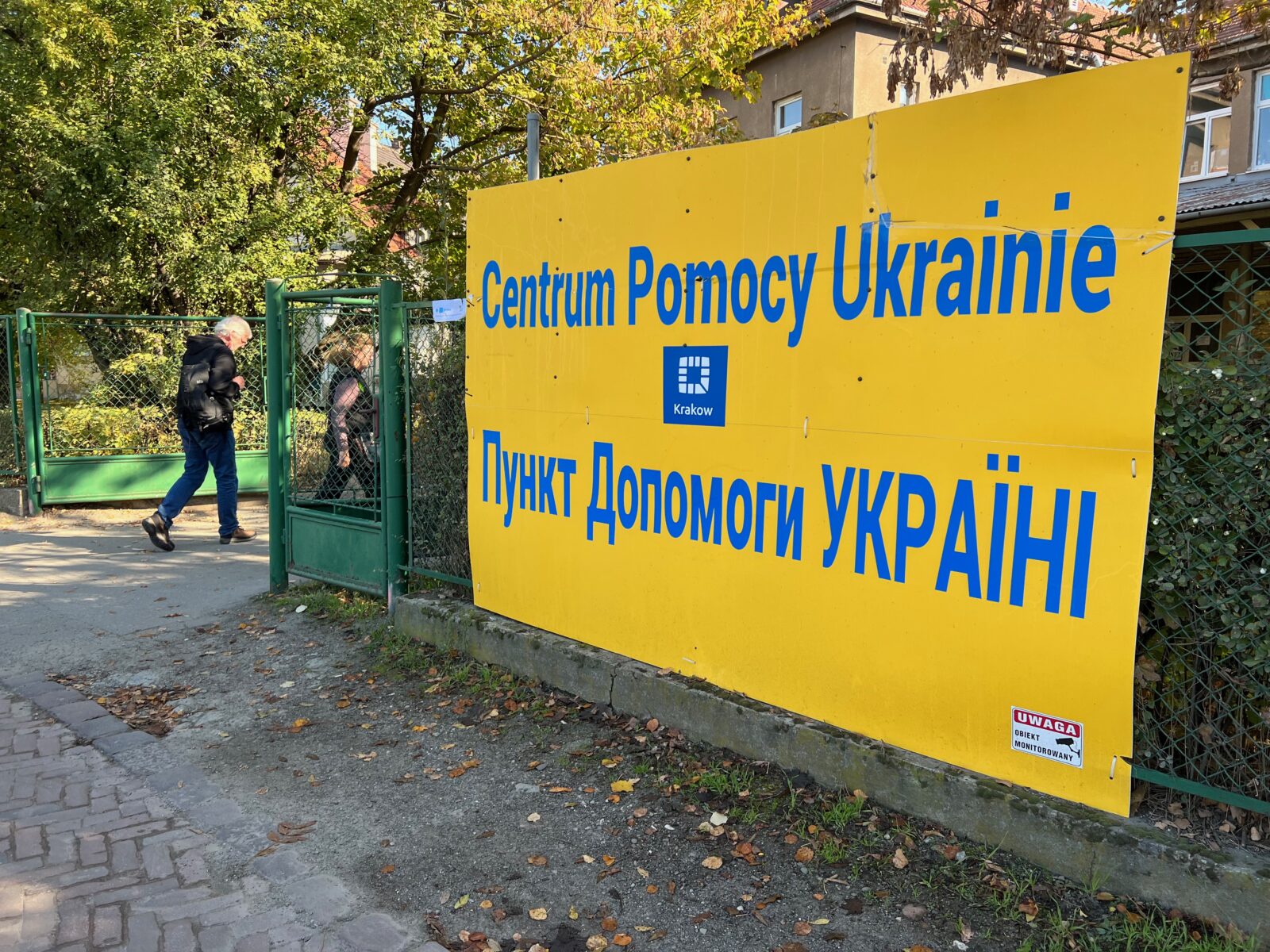
The central volunteering location for Drop in the Ocean is a 15 minute walk from my Airbnb flats in the Old Town, and tucked away between major streets. Here clothing and shoe donations are sorted and stored to be given away at a later time. Pictured beyond the sign is a fellow American volunteer – a retired lobbyist attorney from Portland. My uncle was a senator in Oregon and they knew each other well – pretty small world indeed.
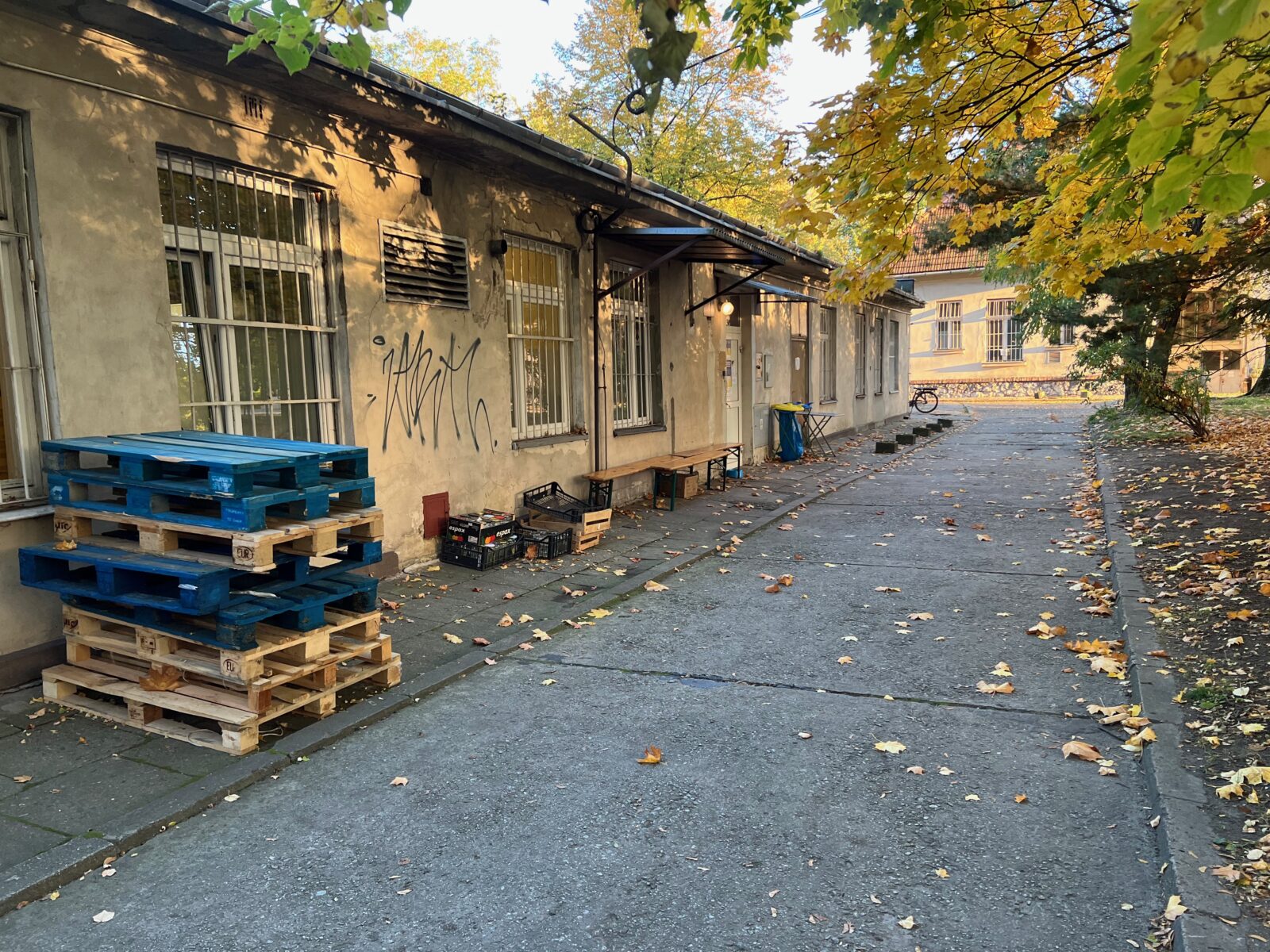
The facility was chosen and provided by the Polish government. It’s a former mental hospital that wasn’t being used. In a nutshell, the volunteer organizations get what they are given (from the Polish government) and try and make the spaces work as well as they can. Half of this building along with other buildings inside the property, have dozens if not hundreds, of Ukrainians living temporarily – with our organization making use of the other half of the building.
In the first few days in Krakow, volunteers would were responsible for taking large amounts of donated clothing, sorting and organizing it. Basically, we would walk into a room of piled clothing (below), bringing them into a separate room, sorting them by type of clothing, gender, and size. When full, those boxes were labeled, given a specific tracking number via a QR code/app, and stacking them in another room. You might have 4-5 people in a relatively small room sorting piles of clothes, with many items being ‘best guesses’ about sizes, and type of clothing. Many donated pieces didn’t have sizing tags so you’d hold up a clothing item and make your best judgement. A few piles of donated clothes were sorted and even folded. Those were welcome outliers, but so many piles were mixes and matches of sizes, genders, and types of clothes. Not all clothes were allowed to be accepted as donations like dirty or torn clothing, used bras, underwear and socks. I’ll never look at donations the same way, and will definitely sort my clothes more neatly before donating next time around.
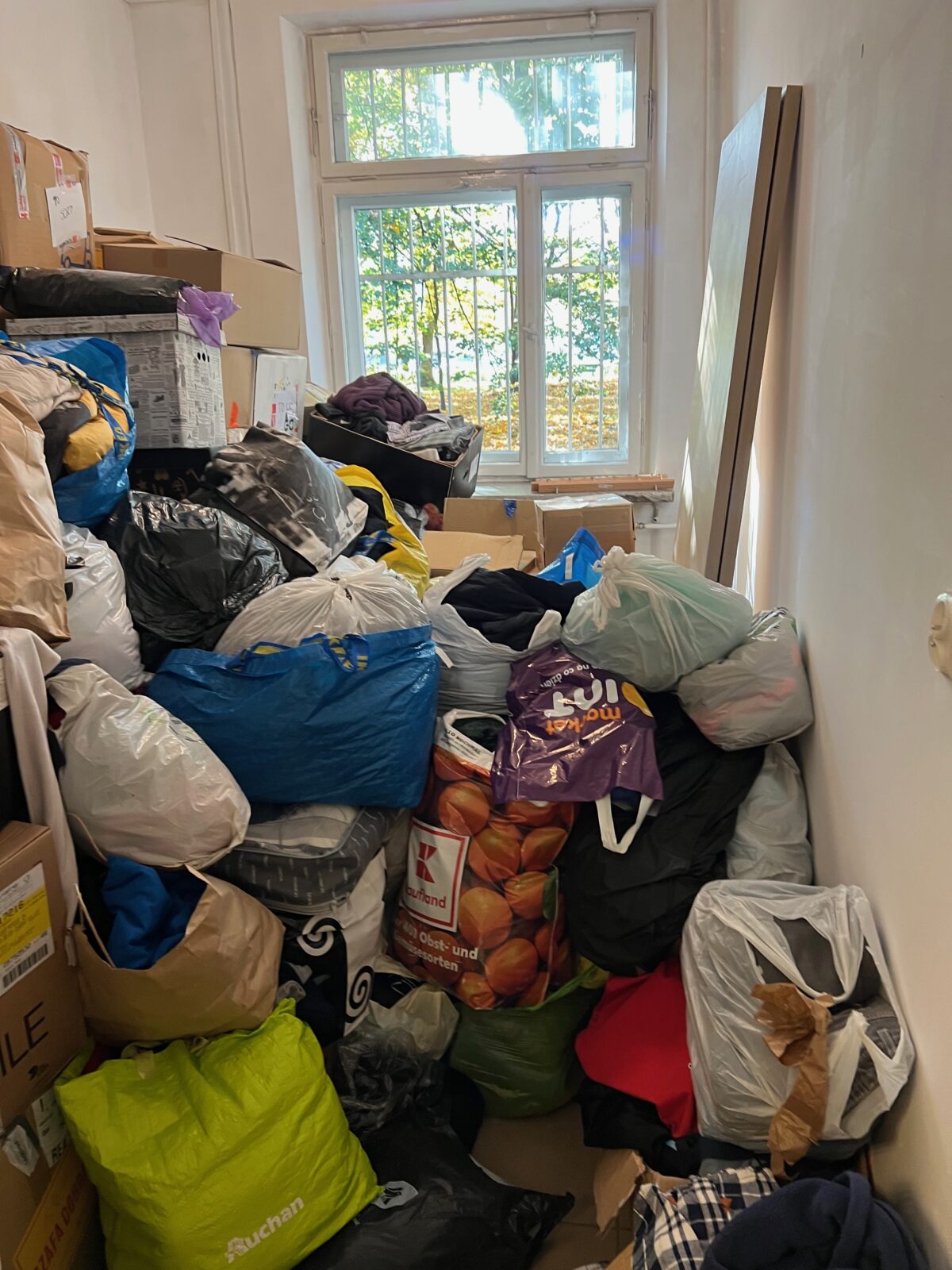
There are 3 different sites that the Polish government has allotted Drop in the Ocean for Ukraine relief. In a week of volunteering, I was fortunate enough to visit and work at all three sites. Donations come from a variety of places but end up at this central location. Many volunteers start with sorting clothes…or just grabbing a bag or two of items from one room and bringing them over to another room where you sort by gender, size, and type of clothes. Boxes are filled and then labeled with the contents along with a QR code. Donated items include new and used, but almost all were used. Underwear and socks are only allowed if they are new. I sorted thousands of clothes at this site, and have a new found respect for the work behind the scenes in the donation process.
The stacked boxes (above) were a couple hours of work with 3-4 volunteers. Boxes were constantly being filled, replaced, brought into the hall, and loaded into trucks to be transported to other locations. Clothing donations continued to pour in from all over Krakow (and beyond), so there was a constant effort to get those items into the proper channels so they could ultimately end up with the people who needed them.
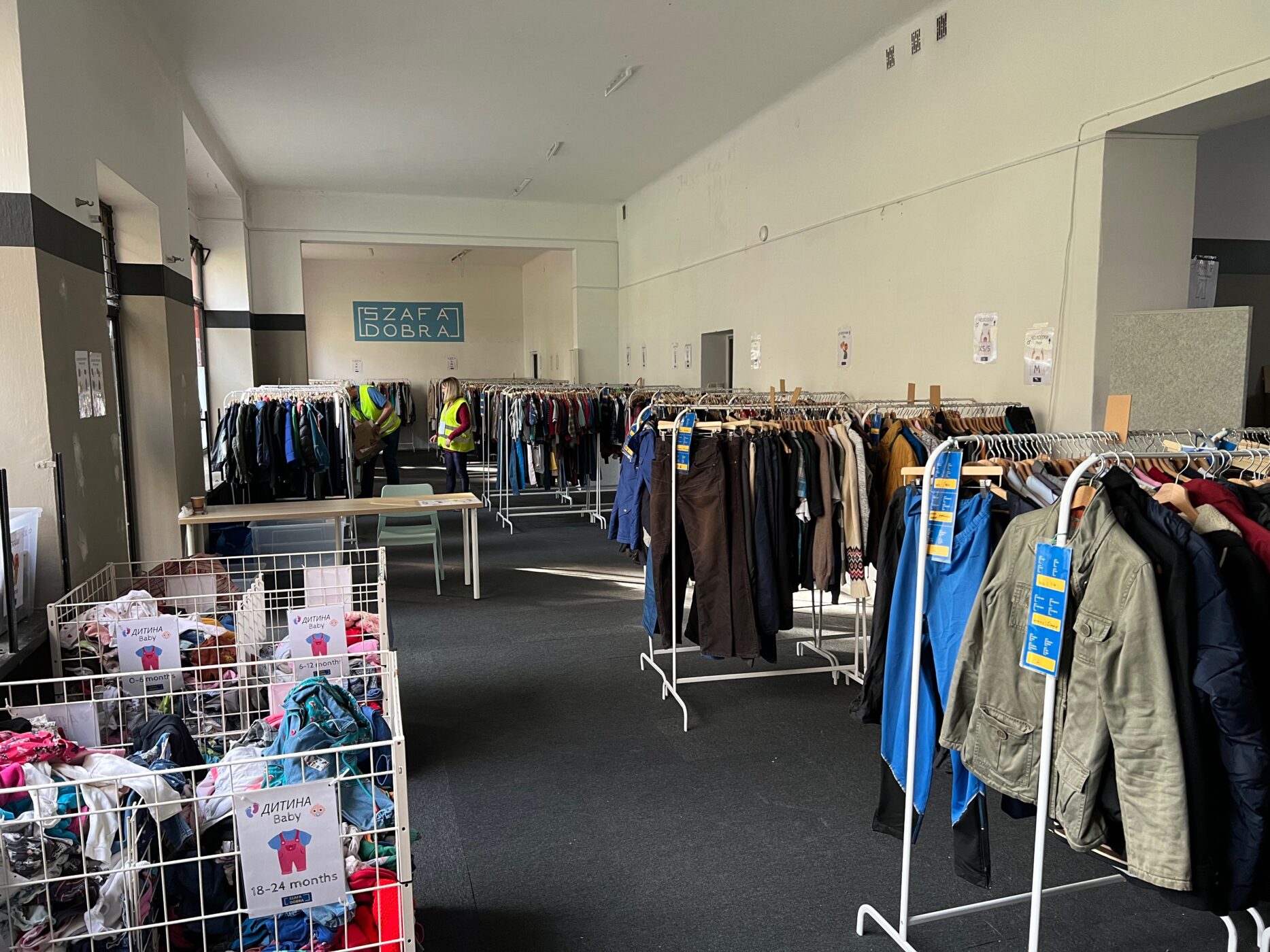
During the beginning of the war, an old shopping center in Krakow (similar to the current setup in Przemyśl) was also used to provide services like this clothing site, to Ukrainian refugees – mostly because of the sheer volume of people fleeing into Poland. Now smaller sites are being used, but large volumes of clothes are still being donated, sorted, and given away to Ukraine families (mostly women and children).
Rules for the amount of clothing a person could have had to be established because abuse started to happen. For example and according to a Drop maanger, a few months back one person took 600 pieces of clothing. After that, a system was created to make the clothing donation process more equitable. Around 20 or so people were allowed to browse the clothing set out for them on the racks. Before that happened, they registered their passport/documents with someone at the entry. If you were in the country longer than say 30 days, you could not receive clothing. The clothing drive was focused on those who had newly arrived in the country. You could also not take items for people not with you, unless you brought their documents with you to the clothing center. Then when shopping, you were limited in the amounts of clothes you could take but that varied by item. For example, beneficiaries were allowed just 1 pair of shoes and 1 winter coat. However items that were in abundance, like baby clothing, were essentially unlimited and people could have as much as they wanted. Shoes in specific sizes (Euro 39-41) were hard to come by, and with the winter coming, were probably the most difficult thing for people to get. I made several trips to local shoe and sports stores and bought many pairs new shoes with funds I raised before leaving for Poland. It’s a small piece of what’s needed, but after sorting dozens of large boxes of donated shoes, I know the sizes and kinds of shoes I purchased will be needed and go fast.
Here’s a food and household items location, not far from the main sorting center. There’s a lot happening a pretty small area. Organizing and distributing a variety of goods isn’t easy but the system that’s in place works pretty well.
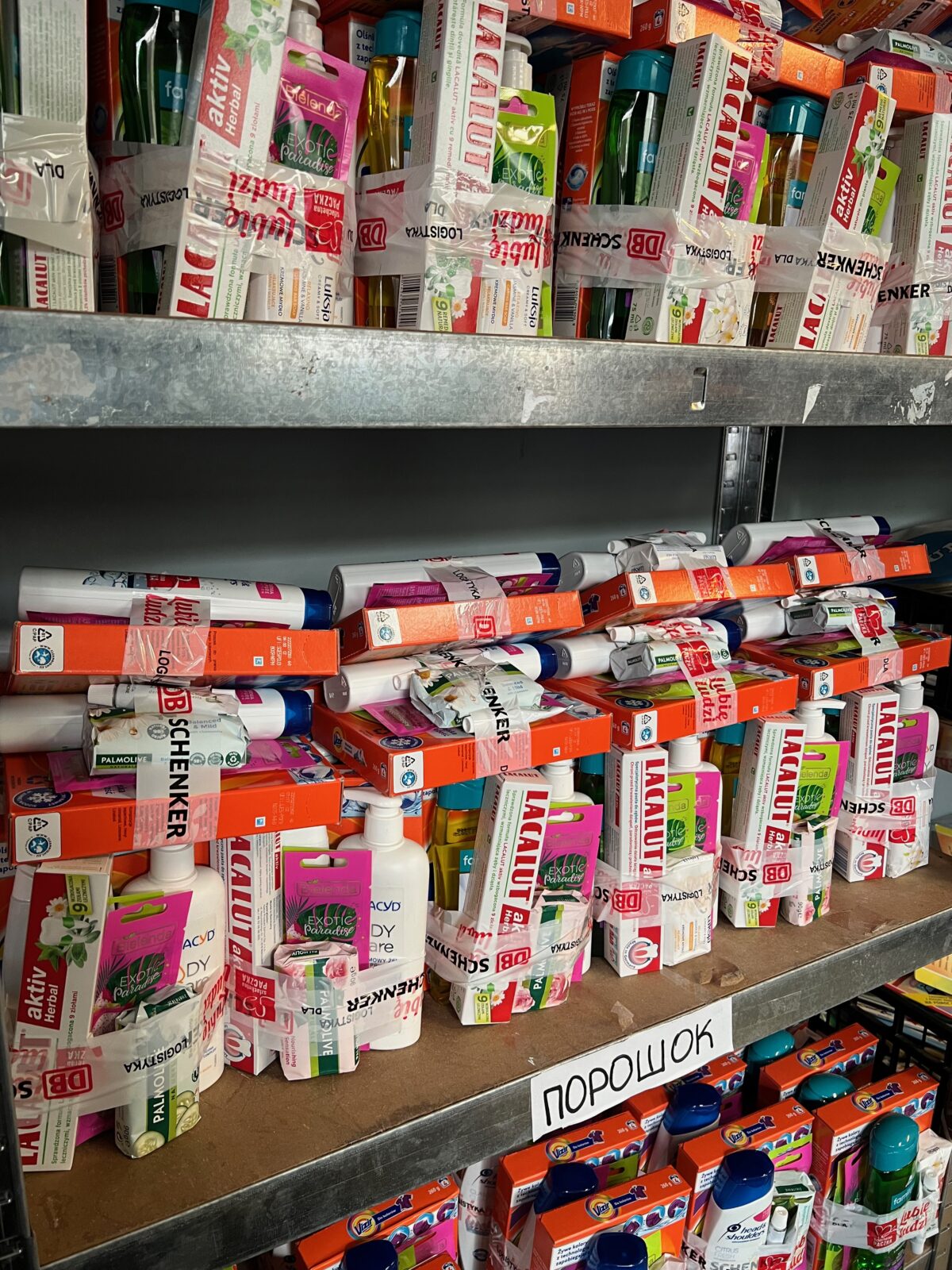
My job this day was getting packets of some household supplies taped together; enough for at least a head start to a new life. I taped up a few hundred of these until I ran out of supplies. Once you run out of something, there’s generally no backup, you’re just out.
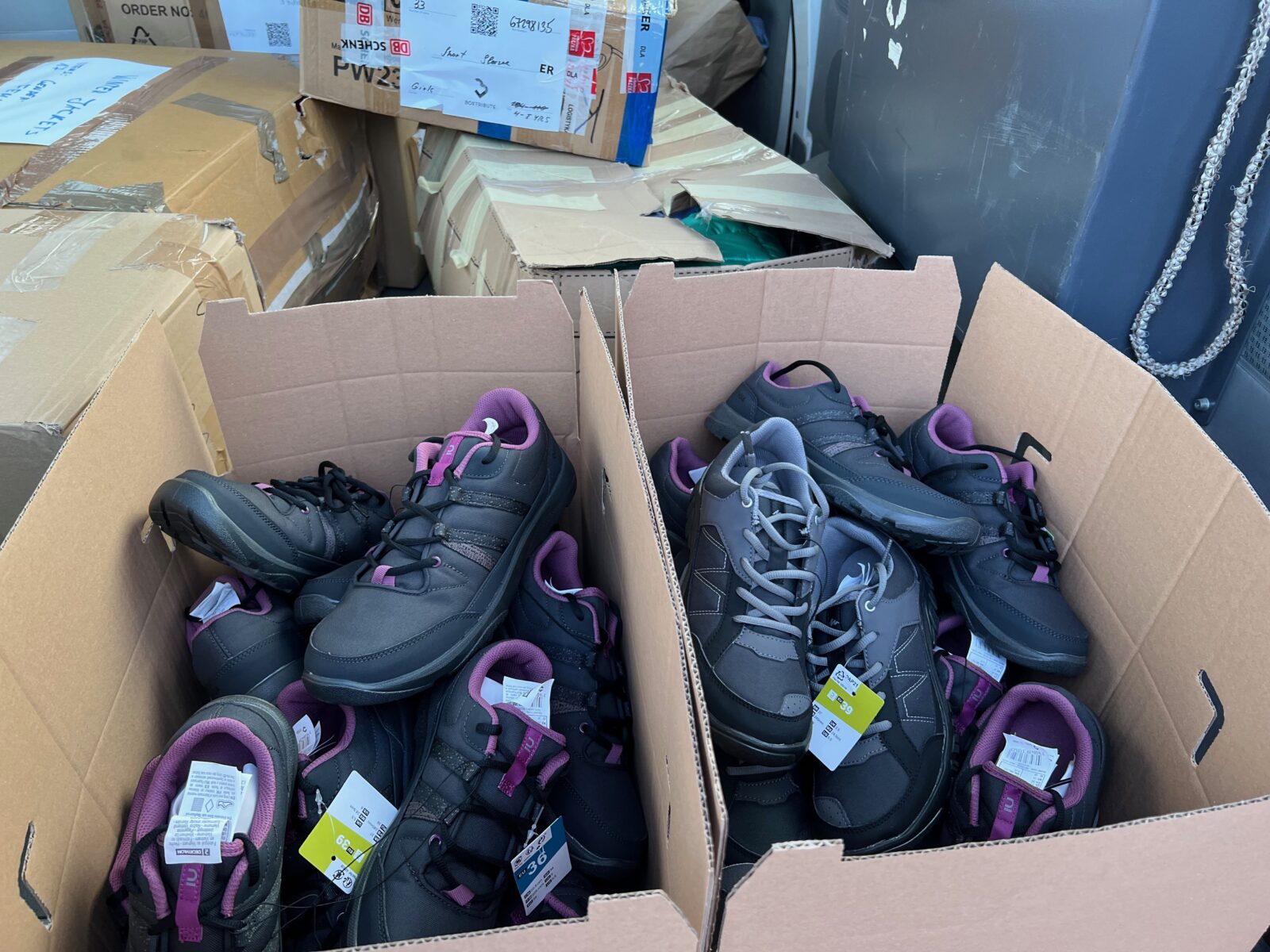
I raised some money through a GoFundMe campaign – my first – and use the money to buy toys, games, and school supplies for kids in Przemyśl along with clothing and other items like shoes in Krakow. This was my last purchase but similar to other trips – 25 pairs of shoes in sizes that go quickly and that were in high demand. Giovanni (Italian) the logistics guy for Drop in the Ocean and I made van runs to Decathlon, a sports store and bought out their supply of shoe sizes that were in high demand. Not all stores are thrilled at money and items going to Ukrainians, but this store is friendly to the purchases and has cheap but quality shoes.
The second week of volunteering did involve quite a bit of lifting. I lifted boxes of various sizes and weights to different rooms, trucks and locations. Most of the volunteers were older/female and I was happy to do the bulk of the lifting. The thing that was the most difficult for me was that I brought poor shoes with on the trip. Before leaving the U.S. I saw that rain was in the forecast almost daily in SE Poland, so I brought some versatile shoes that matched most any outfit, but that had terrible soles. My feet were literally in pain every night and standing for many hours each day, along with longer walks around town, took its toll. I didn’t think the poor soles would be a big deal, but it definitely was. It turns out the weather was incredible, raining the first day and having near perfect sunny days the rest of the time!
Dropen i Havet required at least a week commitment from volunteers, with many doing multiple to several weeks or months. One thing that was unique besides the opportunity to see different sites and phases of the humanitarian effort was that all volunteers were invited to dinner twice during the week. A Ukrainian restaurant in the Old Town was chosen the second night and top Michelin rated restaurant in the now trendy Jewish quarter Kazimierz the other night. For $20 USD you have some incredible food and wine. Even with inflation, food is still cheap in Poland. Others that I either met or who I heard volunteered for Dropen i Havet all had positive things to say about their experience. It was a good amount of work, but I also had an enjoyable time.
Krakow
Krakow is Poland’s best city. It somehow went largely unscathed in WWII and the central square is pretty remarkable. There’s a ton to do there, both in the Old Town and outside via day trips. I had been to Krakow 2-3 times before this and
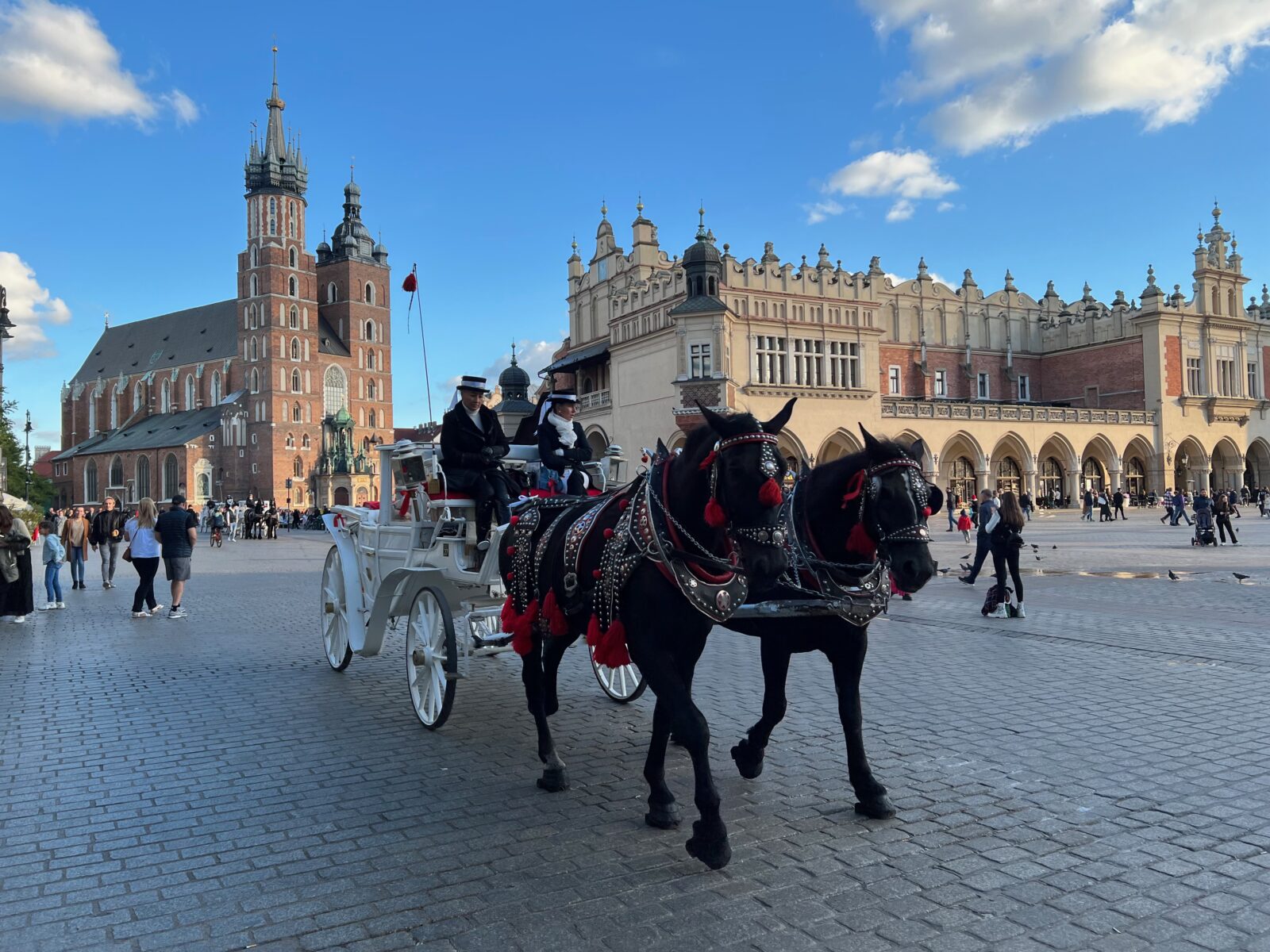
Krakow is one of Europe’s best cities to visit as a tourist. Auschwitz, and the Wieliczka Salt Mine are both easy day trips and the Old Town square is incredible.
Apparently the number of people displaced/fleeing the Ukraine war is 7.7 million. That’s an April statistic and it could easily be more than that now. When you read stats like that it’s difficult to comprehend the number of people who have seen the effects of war. Seeing images or even video of the war on tv might make it a little more real, but being on the buses, trains, and areas where you constantly hear Ukrainian and Russian (most Ukrainians will speak Russian) being spoken, and see people/families in the humanitarian aid centers laying on cots, picking through donated clothing, and waiting in line for food – it hits home.
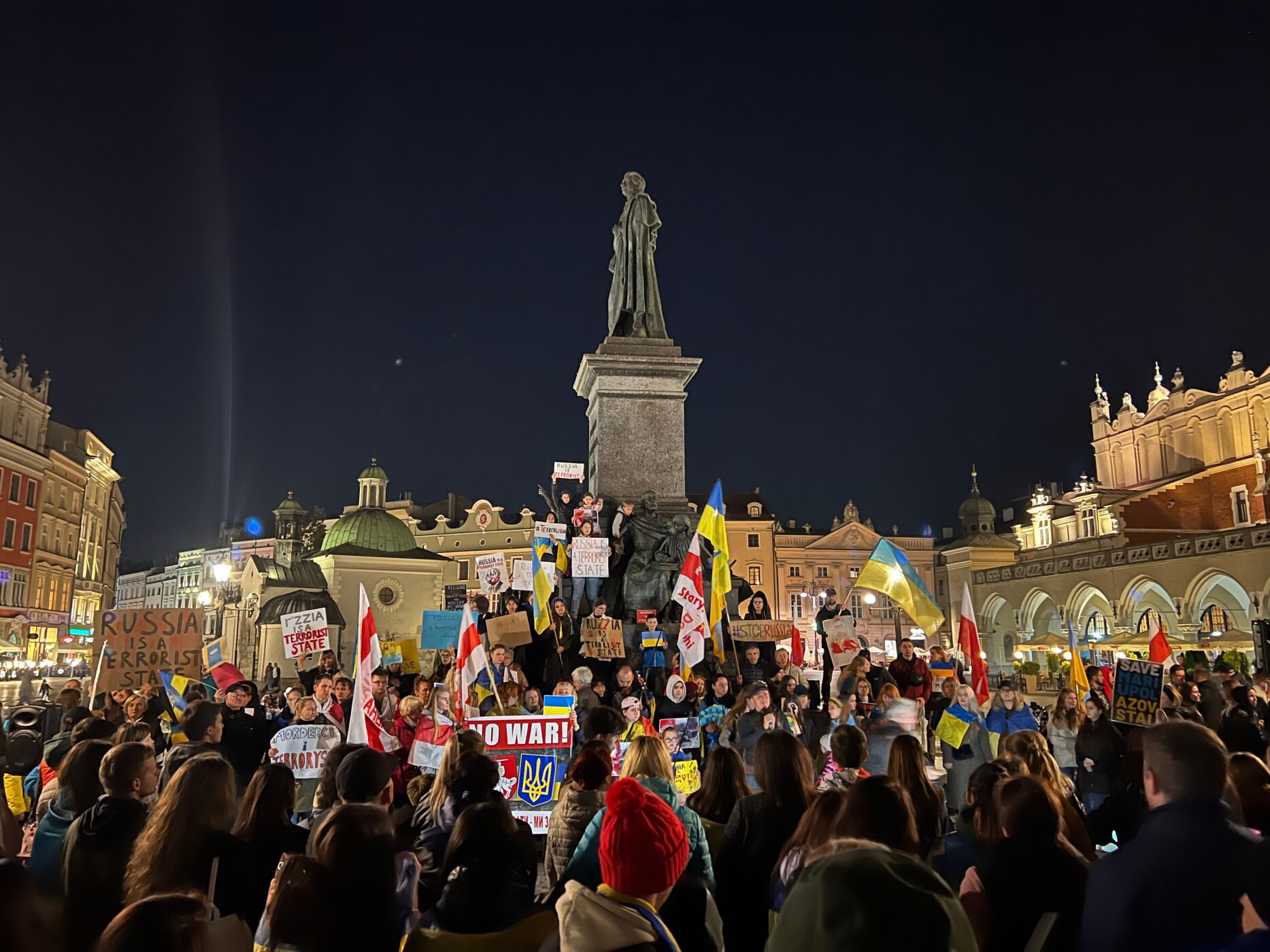
Protests against the war in Ukraine in Krakow’s main square happen each night with a varying amount of turnout depending on the day and events that are unfolding.
For my second week of volunteering the costs were all my responsibility. I rented 2 Airbnb’s in the Old town for around $35-$40 USD/night, and for my final evening, splurged 45,000 Radisson Rewards points on the Radisson Blue across the street from the Old Town. I had a redeye (6 am) flight on Lufthansa out of Krakow to Frankfurt, Germany. Initially I was going to put my checked luggage and backpack in a storage locker at the Krakow train station and stay up into the early morning hours, then make my way to the airport around 3 am. The money saved vs. the time and energy it would take to transport my luggage to the storage area didn’t seem worth it, so I opted for a hotel with points instead. The Radisson Blu is the best situated points linked hotel in Krakow, and was more luxurious than I remembered. I still had mid-tier Gold status that got me upgraded to a business class room, which was very spacious and had a wonderful shower and bathroom too. The breakfast was nice too.
Summary
When I first thought about what I could do to help people affected by the war in Ukraine, I wasn’t sure what I could do. I thought about renting out Radisson properties for families, but didn’t know how that would actually work. After returning, a few people have asked me if I’d do it all again, and the answer to that question is yes – 100%.
I have few complaints about the past few weeks of volunteering overseas. The thing I was most disappointed with is that the first organization, Fundacja Ocalenie, should have encouraged people to raise money and bring toys/supplies for kids and families. At first glance it seems like the center for kids had plenty of supplies and toys, but if you actually looked closer, that was not the case. Even if the war ended, those toys and other supplies would find a home for children somewhere, as the organization is based in Warsaw and serves the Ukrainian and others in need. The only other thing I would change is the shoes I brought with. Those shoes caused me a lot of pain during the trip and I threw them away before departing. I also brought a pair of more dressy shoes, and wore them back on the return flight.
Before departing I wondered if I could even make a difference in what was happening, and if it was worth it to go, especially considering Covid is still around. The answer that has become quite clear is that I know this volunteering did make a difference. The reason I know that it did is because if volunteer based organizations don’t have enough people helping on a particular day, like at the childcare area in Przemysl, the site simply wouldn’t open. Kids would be left to wonder the mall, likely alone, and continuously focus on their pretty dire situation. If Drop didn’t have enough volunteers at a location, they would shift operations to another site and combine what personnel they had and the system of donation logistics would be disrupted. In short, the work effort really did depend on volunteers. You could donate all the food and clothing in the world, but if there weren’t people to sort it, organize it and distribute it, then the system of putting it in the hands of the needy would fail. I didn’t volunteer to feel good about myself, and am not writing this as a celebration of my personal effort. Part of why I went was curiosity about the situation on the ground – which feels a bit selfish – but also from the general desire to help people, even if it was just for a few weeks. I’m very thankful for the people who donated money in my GoFundMe effort too; you allowed me to have a very positive impact on the ground for people in need. If I had more time off from work, I’d likely still be in Poland or Ukraine volunteering.

